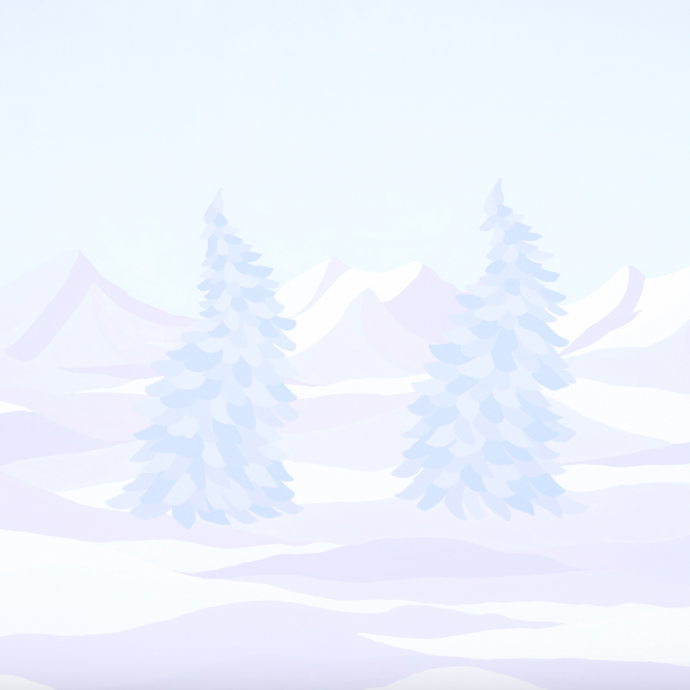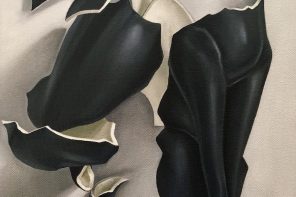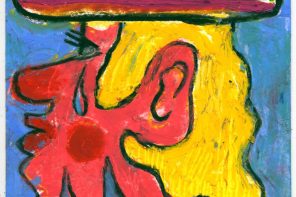The climate changers went too far, and soon it started to snow. At first it was big wet flakes that wanted to be rain but later settled into snow. The children, not knowing there was anything wrong with snow in July, got out their galoshes. On their sleds they screamed down Murder Hill, as they called it, there beneath the town name on the water tower, where icicles were slowly forming in the cold air.
In a week they were all inside. The cold had gotten into them, and they sat staring out the windows as their mothers made soup. It was still snowing. It was still snowing and the wind whispered up under the eaves and at night the adults woke and stood at the living room window and watched the snow and worried.
On the news the weathermen made apologies. They said the snow would end soon, but soon they stopped saying anything. The weather was replaced by how-to reporting: here’s how to build snowshoes, here’s a way to stay warm if you have to go out in your snowshoes, here’s the best way to burn your snowshoes if you run out of wood. The climate changers, the news anchor assured the audience, were working hard for a reverse, some way to restore the world to the way it had been, but soon they stopped saying that as well.
By August, there were no cars on the road. By September, when the children should have started back to school, there were no roads. The plows could not keep up, and there was not enough salt or cinders anywhere to melt the snow. When the adults woke in the middle of the night to look out the living room window, there was no world, only white.
The fathers, the way fathers will when worried, dug tunnels between the houses, and some Saturday nights the Harrises went next door to the Carlson’s and drank too much gin while playing Gin, which Mrs. Carlson found endlessly amusing. Her hands shook when she held her cards. She said her nerves were shot, and everyone tried very hard not to look at the windows, where the snow waited like an unwelcome whale.
Upstairs, the Carlson kids were showing off toys they’d long grown tired of. Tank Carlson said he had some cigarettes stashed in the basement, but no one had the nerve to smoke until they’d had a few drinks of the gin he’d stolen from his parents. When they went out into the tunnels to smoke, the cold didn’t bother them. The sides of the snow tunnel had turned blue, faint moonlight filtering down to them far below. Mason Harris, drinking gin, could almost remember what it was like to be warm.
So when Tank said they should go topside, they all agreed. Tank’s sister Stephanie, almost 15, led them. Mason followed his sister Suzie, who no longer wanted to be called Suzie and preferred Sasquatch instead. Or maybe that was only what Mason called her when she wore her fur coat—with the gin it was hard to remember. Other things that were hard to remember: the sun, the sky, trees that weren’t stripped of leaves.
Outside, the snow had stopped. It did this every few nights: the snow would stop and the clouds clear, and on these nights the temperature dropped so low they could hear things breaking as the ice exploded them. The moon was always so bright these nights, and a ring circled around it like a promise. From his second-story bedroom, Mason could see it. Some nights he howled a little, to himself, at the moon.
This night was not so cold. Or maybe the gin was warming them. Whatever, Mason thought, no longer concerned with small things. He was watching the moon. At the far end of town the water towers—long ruptured from the frozen water within—still spelled out the town’s name. The snow had not yet gotten that high because every few days a fierce wind would sweep a few feet of it somewhere else.
This had happened tonight—the wind had swept a few feet of snow away, and standing there in the front yard of the Carlson’s house, they could see inside, just a sliver at the top of the window. Mrs. Carlson had passed out at the table, though she still held her cards aloft. Every few minutes Mason’s mother would reach over and play a card for Mrs. Carlson. Stephanie was crying ever so slightly, and her tears tinked off the snow when they hit, having frozen on the way down. Tank turned up the bottle of gin. Sasquatch pulled back the coat that covered most of her face. She turned her eyes up to the moon.
“It’s not so bad,” she said.
Mason had to agree. He took the bottle from Tank, and they stood there looking in at their parents. It would be easy to blame them for all the ills of the world, Mason thought, but it might be even easier to forgive them. With his breath blowing before him, he could see what would happen. In a few minutes they would go inside. Their parents would be drunk and Mason and his sister would have to lead them home through the tunnels their fathers had built. They would lead them home and take off their shoes and put them to bed and tuck them in, then he and his sister would sit in the living room, perhaps drinking slowly, perhaps not, just sitting and listening to the wind and the house and the wind.
The snow would continue to fall. School would stay closed. They would all get dumber. They would vote for politicians who stood against their best interests, for corporations that killed the climate then claimed they could revive it with the same policies that had killed it. Their parents would sleep more. They would grow old overnight with the weight of the mistakes they had made. Mason and his sister, increasingly, would put them to bed. Their parents would ask for stories of when the world was warm, and Mason would clear his throat and tell them of his childhood.
If there were still a world in January, Mason would turn 13. It was an awkward age, when his voice would drop into the serious tones of a man. He was supposed to find a girlfriend, do well in school, run varsity track, but all the girls were grounded by the snow, school had not started, and everywhere the world was iced so there was nowhere to run.
At his 13th birthday party, he would kiss Stephanie Carlson. There were no other girls who could make it, and no other boys for her to kiss. “Limited choices,” she said, shrugging, as she put her mouth on his.
By March there would be no going outside. The wind too strong, the cold too sharp. Insulated in their houses, they would take care of their parents. Saturday nights they would go to the Carlson’s and drink Mrs. Carlson’s gin and play Gin, Mason and Stephanie against Tank and Sasquatch, who would sometimes hold hands when they thought no one was looking. Mason wore his father’s coat. Tank wore his father’s glasses.
And every Saturday night, when Stephanie and Sasquatch excused themselves from the table to check on the parents, Tank would lean back in his chair and squint at Mason.
“What the hell are we going to do?” he would say.
Mason never had an answer. He only knew there was a way to reverse all the damage that had been done. A way to sweep clean the sidewalks. He knew temperatures had fallen 40 degrees, but the sun, scientists said, was still there, even though the winter that had set in might last as long as a lifetime.
Paul Crenshaw is the author of the essay collection This One Will Hurt You, published by The Ohio State University Press. Other work has appeared in Best American Essays, Best American Nonrequired Reading, The Pushcart Prize, anthologies by W.W. Norton and Houghton Mifflin, Oxford American, Glimmer Train, Tin House, North American Review, and Brevity, among others.



